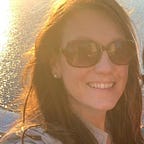Promoting Rights and Opportunities
An Armenian advocate uses her voice for the empowerment of persons with disabilities
Born with cerebral palsy, Anush Aslanyan, 30, went to school in her rural community outside Vanadzor, Armenia, on horseback. Her parents took time away, twice a day, from work on their farm to accompany her.
In third grade, Anush’s horse was stolen.
She faced the dilemma of going to school on foot or staying home. Anush chose the former and walked the two kilometers to school with her mother, without the assistance of a cane — often arriving at her first class exhausted from the effort. However, this early experience taught her about self-sufficiency, and embracing obstacles.
“I wake up everyday knowing it’s hard, but still have to do it,” she said. “I like challenges, so this is my motivation.”
Later, while seeking her Master’s in Biology from Vanadzor University, Anush began advocating for building accessibility for fellow students. Her leadership led to infrastructure changes, including a new handrail for the stairs in the hallway, and a wheelchair ramp to the library.
Promoting Disability Rights in Armenia
That advocacy was only the beginning. In 2014, Anush founded Equal Rights Equal Opportunities (EREO), a local disabled persons’ organization (DPO) in Lori region, located in northern Armenia, close to the border with Georgia. EREO is the only cross-disability DPO in this region.
In 2019, with USAID’s support, EREO, in partnership with Mobility International USA (MIUSA) and AGATE Rights Defense Center for Women with Disabilities non-governmental organization, launched an independent living movement in Armenia. Its purpose is to empower persons with disabilities to live independently and participate fully in their communities as well improve their quality of life and help change the attitudes of society.
“As persons with disabilities, we found it vital to highlight our perspectives and advocate for the rights of our community,” said Anush, in reference to her organization’s staff.
This has included supporting more than 200 people by advocating for the accessibility of physical environments and public buildings for persons with different disabilities in the Lori region, and organizing trainings on inclusion and disability rights in schools and public organizations.
Additionally, when rights have been violated — such as when a wheelchair ramp is not constructed properly, a street crossing has not been added at a busy intersection, or the wrongful classification that prevents persons with disabilities from obtaining the free medical care to which they are entitled — Anush assists persons with disabilities to engage with the local government or relevant entity to resolve these issues.
In 2019, Anush’s leadership caught international attention. She was chosen out of 300 applicants to be one of 22 women leaders and activists with disabilities from around the world to take part in the ninth international Women’s Institute on Leadership and Disability leadership training program, of Mobility International USA (MIUSA). In the same year, Anush also organized a training sponsored by MIUSA to discuss international and leadership development opportunities for women and girls with disabilities, and which included yoga, self-defense training, and empowerment activities.
Her efforts have not only lifted the voices of persons with disabilities in her community — they have changed her own perspective.
“After six years of running my organization, only now do I respect my disability,” said Anush. “I wish for others to accelerate the acceptance of their disability and start to live like other people. Life is short, and when they are 90, they will realize their disability has always been with them and they didn’t enjoy life.”
New Law Bans Discrimination, Promotes Inclusion
Anush’s activism has been especially relevant against the backdrop of the legacy of the Soviet Union, in which systemic societal prejudice has led to discrimination against and marginalization of persons with disabilities that limit opportunities in all aspects of life and society — including education, employment, transportation, and family life.
However, societal response to the barriers faced by persons with disabilities is changing.
On May 5, 2021, Armenia’s parliament adopted the law on the Rights of Persons with Disabilities, which promotes protection from discrimination and creates opportunities for a more inclusive society. This long-awaited reform has the potential to change the lives of the roughly 200,000 people with disabilities in Armenia; a number that increased due to those who acquired physical and psychosocial disabilities during the 2020 Nagorno Karabakh hostilities. It is also a step toward implementing the state’s commitments under the Convention on the Rights of Persons with Disabilities, which Armenia ratified in 2010.
The law’s adoption became possible due to decades of persistent advocacy by Armenia’s national disability rights organizations and activists, including Anush, who is one of founding members of the national, disability-led Coalition on Inclusive Legal Reform and assisted with revising the language for the new laws.
While Anush, along with her fellow disability activists, are celebrating this moment and have high aspirations for the new law, she said that achieving disability-inclusive communities in Armenia will require a critical mass of persons with disabilities who are informed about their rights and empowered to claim them.
Anush’s goal is to help remove the different barriers that persons with disabilities face, including her own — ensuring that no one with a disability remains marginalized, isolated, and invisible.
“At home I don’t feel like a person with disabilities,” said Anush. “But when I leave my house and use the bus I become disabled because I need help to use it.”
USAID supports organizations like Anush’s that work to empower persons with disabilities because societies that include their diverse populations are more likely to be democratic, participatory, and equitable.
About the Author
Jessica Benton Cooney is the Senior Communications and Outreach Specialist in USAID’s Center for Democracy, Human Rights, and Governance.
